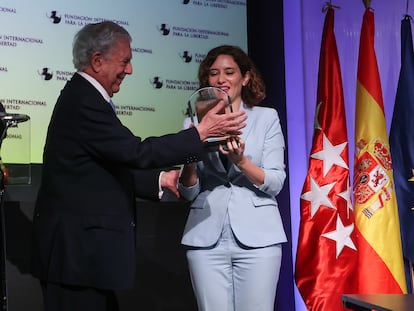Mario Vargas Llosa on Colombia elections: ‘They have voted badly. Let’s see what Petro does’
The Nobel Prize winner underscores that the country has a legal framework that the new president, a former guerrilla fighter, must respect

The event took place in Madrid, Spain, but it could just as well have taken place in Bogotá. By the time the writer Mario Vargas Llosa presented Madrid regional premier Isabel Díaz Ayuso with an award from his Fundación Internacional para la Libertad (FIL, the International Freedom Foundation) on Monday, everyone already knew that the big news of the day was the victory of the former M-19 guerrilla fighter and economist Gustavo Petro in Colombia’s election. After the ceremony, the Nobel Prize winner accompanied the Spanish conservative politician to the exit. There were cameras all around them. And in the brief space of time separating that moment from the televised statement by the outgoing president of Colombia, Iván Duque, Vargas Llosa analyzed the election results in four words: “They [Colombians] have voted badly.”
Vargas Llosa, 86, has become a leading light of liberalism both in the Americas and in Spain. He himself ran for the presidency of Peru in 1990, when he lost in the runoff against Alberto Fujimori. Throughout the years, the author of The Feast of the Goat has distinguished himself for his criticism of left-wing governments in the Americas. Hence, probably, his concern about Petro’s victory, which means that the left will form a government in Colombia for the first time in the history of that country. It is a milestone that journalists have asked him about, recalling how last year the writer defended that “the important thing about an election is not whether there is freedom, but to vote well.”
“Have people voted well in Colombia or have they voted badly?” asked reporters. “They voted badly,” he replied. “Let’s see what he [Petro] does. If he acts within the law, then he is welcome. There is a legal framework that has been maintained all these years despite the fact that the guerrillas represented something else. So we have to see, we have to wait.”
Ayuso, of Spain’s conservative Popular Party (PP), left as quickly as she had arrived after accepting Vargas Llosa’s praises (“We support you, we love you, we admire you and we are absolutely sure that you will take us in the right direction”). The 15th Atlantic Forum, held in Madrid’s Casa de América, moved on to the next item on the program: a virtual dialogue between Vargas Llosa and Iván Duque, who spoke from the seat of the Colombian Government, looking relaxed without a tie.
“Do you think that Petro will act within the law, or that he will take liberties with that legality?” asked Vargas Llosa.
“Colombians went to the polls, and the first thing one must recognize in order to defend democracy is when there has been a popular pronouncement,” replied Duque, of the conservative Democratic Center Party. “Clearly, Colombians have elected a new president. We will provide all our support to guarantee a transparent and efficient transition. Regarding the question you asked, dear Mario, I think that all of us who assume the presidency take on an enormous challenge, to always be guided by order and the law (...) The foundations of democracy cannot be altered, dear Mario.”
Petro prevailed on Sunday with 50.44% of the votes compared to 47.31% of support obtained by his rival, Rodolfo Hernández. “Starting today, Colombia is changing. It is another Colombia. This is not a change to take revenge or to create more hatred,” he said in his first speech as president-elect.
Now the time has come to manage the aftershocks of an electoral earthquake that has been felt from the Americas to Spain. On Monday, the Madrid premier made what could be construed as a veiled reference, the only one, to the Colombian elections: “We have the responsibility to ensure that Madrid continues to be a place of opportunities,” she said. “Judging by what we are seeing in other electoral processes, Madrid, now more than ever, will probably become home to all those fleeing dictatorships and totalitarian systems that impoverish and divide society, and interfere in the decisions of businesses and property.”
Tu suscripción se está usando en otro dispositivo
¿Quieres añadir otro usuario a tu suscripción?
Si continúas leyendo en este dispositivo, no se podrá leer en el otro.
FlechaTu suscripción se está usando en otro dispositivo y solo puedes acceder a EL PAÍS desde un dispositivo a la vez.
Si quieres compartir tu cuenta, cambia tu suscripción a la modalidad Premium, así podrás añadir otro usuario. Cada uno accederá con su propia cuenta de email, lo que os permitirá personalizar vuestra experiencia en EL PAÍS.
¿Tienes una suscripción de empresa? Accede aquí para contratar más cuentas.
En el caso de no saber quién está usando tu cuenta, te recomendamos cambiar tu contraseña aquí.
Si decides continuar compartiendo tu cuenta, este mensaje se mostrará en tu dispositivo y en el de la otra persona que está usando tu cuenta de forma indefinida, afectando a tu experiencia de lectura. Puedes consultar aquí los términos y condiciones de la suscripción digital.









































